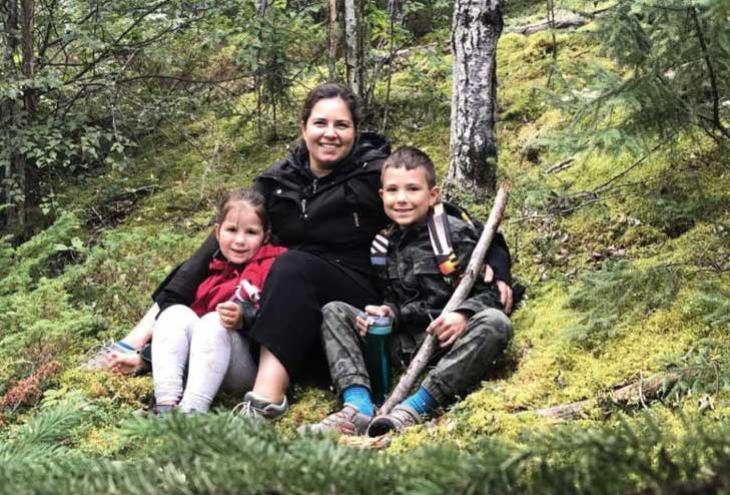A profound connection to the beautiful boreal forests and freshwater lakes of her Lac La Ronge Woodland Cree homelands has guided Sarah Gauthier’s journey from microbiology studies to a successful career in water resources engineering, teaching, and mentoring.
Returning to her University of Saskatchewan alma mater as a STEM coach within the Indigenous Student Achievement Pathways (ISAP) program, Gauthier is also pursuing a PhD in public policy, addressing environmental issues from a larger lens to create meaningful change in First Nations communities. “I went from studying tiny microbes to getting a broader and broader view of problems and solutions,” Gauthier says. “I was longing for more meaning in the work that I was doing, to see the bigger picture.”
With Nîhithaw (Woodland Cree) and French-Scottish ancestry, Gauthier grew up in a small Indigenous community adjacent to the reserve because her mother had lost her Native status by marrying her non-Indigenous father. Her mother — the oldest of 10 children raised by parents who lived off the land and spoke predominantly Cree — modeled trailblazing independence that was an inspiration to Gauthier.
As her grandparents’ home on the reserve had no running water until 1996, Gauthier remembers her grandfather’s meat harvests boiling on the stove and her grandmother filling a huge potable water pail in the kitchen. Gauthier recognized her family’s relative privilege and said growing up in a mixed-race household has helped her navigate the “dance between different cultures” in the workplace.
In high school Gauthier won a regional science fair that took her to a prestigious national competition. That success inspired her to study microbiology with an interest in veterinary medicine. But during summer jobs at a northern mine, Gauthier realized she much preferred the outdoors to laboratory work and observed that the “boss jobs" went to engineers. “A degree in the biosciences coupled with an engineering degree is a really good match,” asserts Gauthier. “In any courses that are water or soil related, there's a lot of microbiology as well.”
Along with her two bachelor’s degrees — in microbiology and civil engineering — Gauthier became the first Lac La Ronge band member to earn a master’s degree in civil engineering. Before accepting an offer to return to the university in a teaching capacity, Gauthier worked in industry for 14 years as co-founder of engineering consulting firm Missinipi Water Solutions and several high-level corporate and board member positions.
Gauthier takes a pragmatic approach to the mining industry that first brought her father to the region and has been a frequent source of employment for herself and family members. While she recognizes that resource extraction can only be reduced by limiting our society’s consumption dependencies, she’s also adamant that any potential development must first be accepted by the people who have lived on the land since time immemorial.
She was drawn toward a PhD program at the university partly because of her anger at a proposed project near her home community that lacked such consultation. Affirming that “decolonization starts with self,” Gauthier recalls first wrestling with industry’s hidden costs on the shores of a pristine lake in the province’s far north that had been slated for a tailings management facility of a proposed mine exploration site. “We had finished surveying the lake and the stream flowing out, and I started to feel this pull,” Gauthier shares. “I started questioning whether I was on the right side of things. What happens to the animals or people who use this water?”
Having children has brought new gravity to residential school realities that have increasingly come to light in Canadian society and in her own family. It’s also fueled a growing responsibility to give back to her community, the biggest financial supporter of her academic journey.
As Gauthier mentors a new generation of Indigenous STEM leaders, she admits that she had suppressed her cultural connection under pressure to conform and succeed at her university. She now believes the deep depression she suffered during her third year resulted from missing the land and her community’s Cree humor.
An Indigenous advisor who knew her family was a lifeline during this time and continues to be an influential presence through weekly Cree language lessons. Expanding Cree language and values in her life has extended to her PhD research, which recently took her to the AISES in Canada National Gathering for a presentation about living in harmony together and industry’s duty to consult.
“Community consultation needs to be grounded in relationship,” Gauthier insists. “Our values can provide a framework for things like environmental policy. When you see everything as having spirit or relationship with each other, that’s very different from approaching a mineral deposit as just monetary value to extract.”













